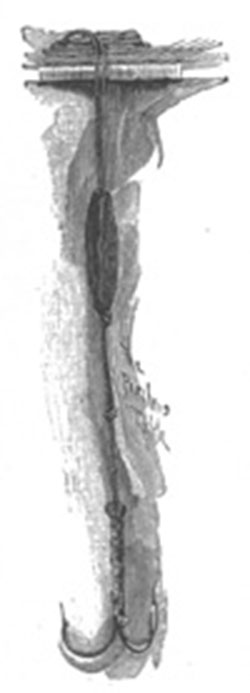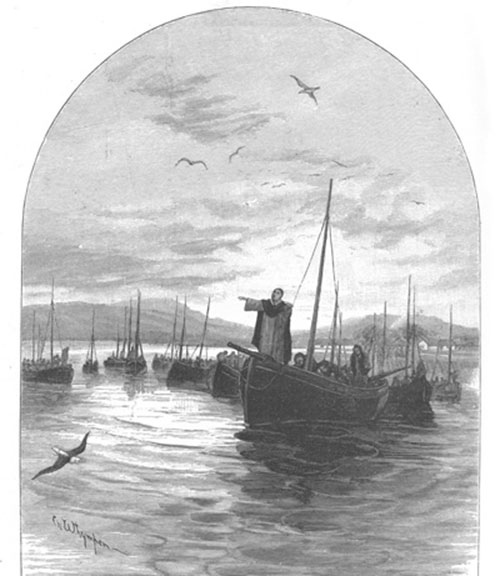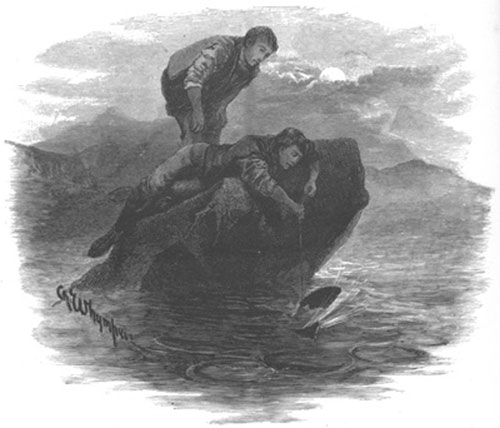The Claddagh - Irish Pictures (1888)
From Irish Pictures Drawn with Pen and Pencil (1888) by Richard Lovett
Chapter VII: Connemara … continued
« Previous Page | Start of Chapter | Book Contents | Next Page »
At the mouth of the harbour, and forming the southernmost quarter of the town, is the Claddagh, a district inhabited solely by a clan of fishermen and their families; they live in low thatched huts, and are engaged for the most part in the herring fishery. By some authorities they have been considered of Spanish descent, while others, with more reason, hold that they are of Celtic origin. 'The commerce between Galway and Spain was, no doubt, at one time very extensive and important. The Spanish style of many of the houses now in ruins, the traditions and authentic records, prove that Galway was in old times a very thriving, busy, gay, and luxurious city. No doubt many Spanish merchants lived in Galway, and intermarried with natives long before the stern old Warden condemned his own son to death for slaying a Spanish rival. A Spanish face may still be seen in and about Galway—once in a week or so; but it appears to me quite certain that the Claddagh, above all other people, had no intermarriage with Spaniards. In proof of this, their present names are nearly all Irish, such as Connolly, Connor, O'Flaherty; there are some English and Welsh, as Jones, Brown and Barrett; those first mentioned, however, form the great majority. The Christian names are generally Scriptural, as John, Matthew, Michael, Paul, also Patrick, Catharine, &c.; but they have this remarkable peculiarity that there are so many persons of the same name that they are distinguished (in the Irish language) by the names of fishes; thus, Jack the hake, Bill the cod, Joe the eel, &c. The men and women of the Claddagh, and indeed of Galway County generally, are very fond of gay dress and bright colours; the country women often wear red cloaks, but the Claddagh women wear blue cloaks and red petticoats; the fishermen wear jacket, breeches and stockings home-made and light blue. The women often go bare foot, and wear the short blue cloak, bed-gown and red petticoat; the head dress is a kerchief of bright colours.
'There are no braver men at sea than the Claddagh fishermen, when they go off with the priestly benediction, and the blessed salt and ashes. On land, too, they can show courage when it is called forth and sustained by the consciousness of right. A few years ago they completely routed a considerable body of dragoons, by casting showers of heavy stones from their slings. By the way, casting pebbles from the sling is an amusement and a mode of warfare peculiar to the Claddagh men at the present day. Since the famine, this and other sports have been held in abeyance, but it was formerly usual for them to have "slinging matches"; and when a man was able to strike a shilling as far as it could be seen, it was considered a good shot. It must be refreshing to a Christian of any sect, who has seen much of the despairing infidelity and brutalizing wretchedness of some parts of England, to witness even the superstitions of this simple, patient, and joyous people. They believe in the actual presence of God among them, and do everything in His name. It is worthy of remark that they never by any chance salute or speak to each other without the name of God. I almost regretted to learn that the priests are discountenancing their old amiable superstitions. I may be excused for these allusions to the religion of this race, for certainly the thoughts and feelings of men form the most interesting phase of human study; and it might be a question with the social reformer whether these people in their ignorance and poverty are not happier than the rich, in whom the emotional element is comparatively dull, and who feel less acutely the joys and sorrows of the battle of life. Here in this remote west the historian also may see in fine preservation much of the life and feeling of the Middle Ages, while all is changed in the "go-ahead" world around. Like seamen everywhere, the Claddagh men have their lucky and unlucky days, and woe to him who dares to cast a line on an unpropitious morning.
Formerly they would not on any account commence the fishing season unless the priest went along with them, and in regular form pronounced a blessing on the day, the boat with the priest sailing out at the head of the fleet.
'The appearance of the village of Claddagh is dirty, but the houses are clean enough inside; and be it known that before the famine their houses were models of cleanliness; and we must recollect that those manure heaps which frequently offend the eye in Irish villages have no offensive odour, on account of the deodorizing power of the peat which forms a large portion of the compost. The men and women have generally clean linen, although often covered with rags. It is a general fact worthy of note that in Ireland a dirty outside generally covers a clean heart.'[1]
« Previous Page | Start of Chapter | Book Contents | Next Page »
NOTES
[1] The Ulster Journal of Archaeology, vol. ii., pp. 162-165.



